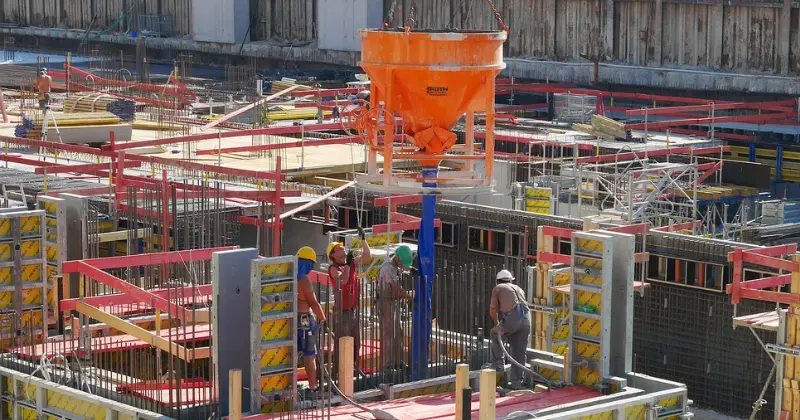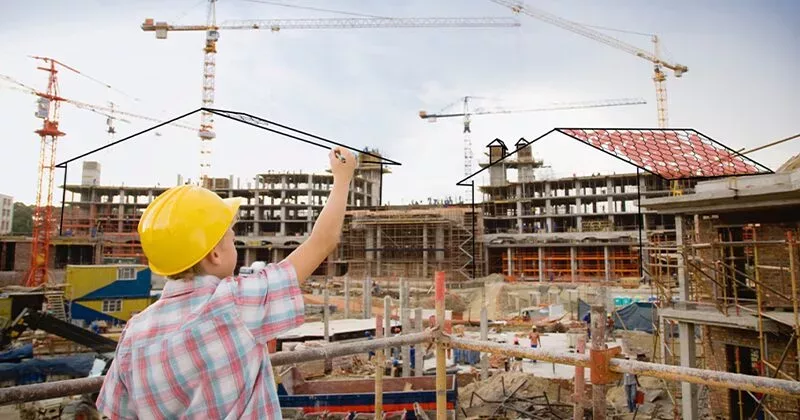11 mins read
The Vital Role of a Construction Project Planner

- What is a Construction Planner?
- What Does a Construction Planner Do?
- Key Construction Planner Skills
- How Much Can You Earn as a Construction Scheduler?
- How to Become a Construction Planner
- What Challenges Do Construction Planners Face?
- What Kind of Software Do Construction Planners Use?
- Final Thoughts
To understand the ins and outs of the construction industry, it is important to be aware of the people who comprise it, and the potential careers that you can follow. To help you in this task, we’ve put together a series of blog posts concentrating on the various construction roles, describing their key responsibilities, skills, educational path, salary, and more. Among others, we discussed the role of the construction architect, the construction HSEQ manager, and the construction estimator. Today, we shift our focus to the construction project planner.
For any construction project to be successful, proper planning is essential. This is where construction project planners enter the picture: Their attention to detail, analytical skills, and collaboration and communication abilities are invaluable in ensuring that a project stays under budget, gets completed on time, and is of the highest quality.
We explore the key salary skills and responsibilities, the challenges they face in the industry, and the tools that help make their job easier.
Let’s begin!
What is a Construction Planner?
A construction planner or scheduler is a professional who creates and manages project schedules to ensure it is finished on time and within budget. To do so, they use professional construction planner software to automate the process and boost collaboration.
These professionals work closely with estimators, engineers, quantity surveyors, and architects to keep projects on track and manage any conflicting priorities that may arise. As such, they need to have effective collaboration skills, as well as a deep understanding of how construction processes work.
One of the main duties of a construction project planner is to identify any potential delays and implement construction risk management strategies with the help of cutting-edge scheduling software. These solutions also enable the planner to break the project down into smaller scopes (called sub-schedules). In this way, the planner knows every intricate detail about the project’s progress and the schedules of the people involved.
What Does a Construction Planner Do?
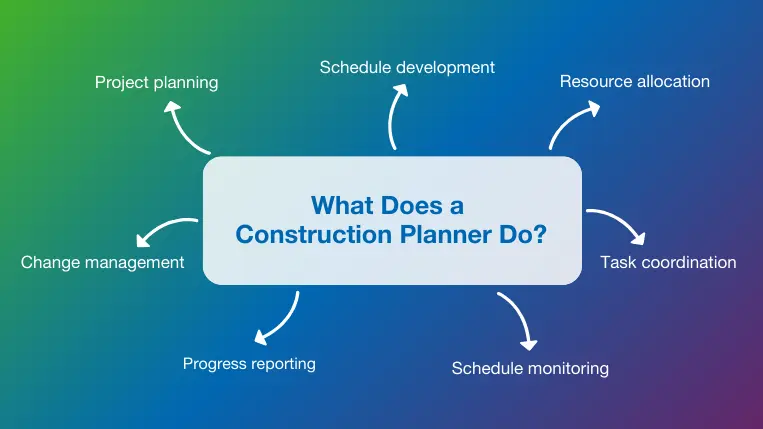
A construction project planner fulfills many roles in the life cycle of a project. These are the main duties of the planner:
Project planning
One of the main tasks a construction planner has is to develop a good construction plan – the basis for developing the budget and the work schedule. This involves choosing the right technology, defining work tasks, estimating the required resources and durations for individual tasks, and identifying any interactions among the different tasks.
Schedule development
Construction planners create schedules based on a team’s capacities and a client’s needs. They organize activities and their sequence in a project, as well as the overall timeframe for it. The construction project planner will also track its progress to make sure that the project is on schedule.
Resource allocation
Part of the duties of a construction planner is working with estimators to calculate the resources needed for a project. This refers to money, equipment, machinery, building materials, office staffing, technology, and software. Here, construction scheduling software plays a vital part in ensuring companies stay ahead of and prioritize team member allocations.
Task coordination
A construction planner’s job is to organize activities in such a way that all tasks are completed in the most efficient and logical sequence possible, considering the availability of resources such as personnel, equipment, and materials. This involves close collaboration with project managers, subcontractors, and suppliers to align all parties and prevent resource bottlenecks.
Schedule monitoring and control
To maintain control over the schedule, a project planner needs to closely check the status of ongoing tasks and compare them to the baseline schedule to identify any deviations. To minimize its impact on the overall project delivery, the planner must take corrective steps, such as adjusting timelines, reallocating resources, or rescheduling tasks, considering any issues that may arise. These issues may include weather delays, supply shortages, or unforeseen site conditions.
Progress reporting
The planner often produces progress reports and forecasts for team members, clients, and stakeholders. Construction reports are critical tools for tracking the project’s milestones, material usage, and labor on a daily, weekly, or monthly basis. It ensures on-time and on-budget delivery, and it is crucial for a construction scheduler to master these tools.
Change management
Because changes to the project’s scope, design, or timetable may have such a profound effect on the budget, schedule, and overall success, efficient construction change management is an essential role of the construction planner. Planners work closely with stakeholders to assess the feasibility of proposed adjustments. After identifying changes, the planner modifies the project schedule and resource allocations to reflect the new needs, revising dependencies and milestones. This often involves revising timelines for procurement, subcontractor work, or regulatory approvals.
Key Construction Planner Skills
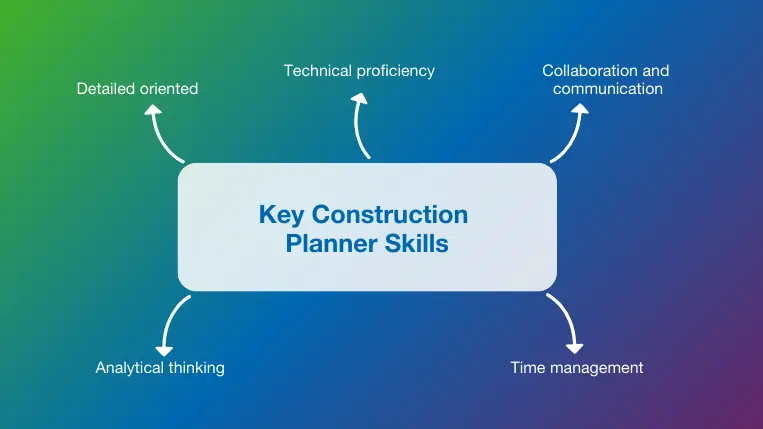
Because of the fast-paced work environment, a construction planner needs to have a wide range of people, technical, and analytical skills to help them excel in their role:
Detailed oriented
Planners must be detail-oriented and know which milestones are required for a project to be completed. Being meticulous and detail-oriented is also vital in creating precise project schedules and reports.
Technical proficiency
Strong technical skills are what separate the old, traditional way of doing project management from the technological innovations that are driving the industry forward today. This not only enhances the accuracy and efficiency of planning but also fosters better communication and collaboration in construction projects.
Collaboration and communication
Construction planners need to have a real knack for people to be successful in their jobs. Collaboration is a critical way to enhance any project, as it leads to increased construction productivity, decreased risk, and higher quality. The project planner also typically provides instructions to team members, so having clear communication skills is key to making sure that all the loose ends are tied together.
Time management
To save time, effort, and money, a planner keeps a project on a tight schedule. That is why they need excellent time management skills, often using digital calendar applications to ensure team members can complete tasks and reach goals effectively.
Analytical thinking
Construction planners must be able to study a situation, gather data, and draw thoughtful conclusions from it. Assessing blueprints and briefs is something a planner does regularly, which also requires critical analytical skills.
How Much Can You Earn as a Construction Scheduler?
The average construction planner salary can vary depending on factors such as experience, location, company size, and industry sector (residential, commercial, or industrial). In the United States, the average salary for a planner is around $65,702 per year, and senior-level planners can expect to earn around $84,000 annually. In the United Kingdom, the average salary for a construction planner is £56,945 ($75,792) per year.
How to Become a Construction Planner
To be a successful construction planner, you must have a strong background in construction project management, a keen eye for detail, and the ability to handle multiple projects simultaneously. Candidates for hiring typically have at least a high school diploma and preferably a degree in a related field like construction management, project management, construction science, or construction technology. You can also attend a trade or technical school to learn practical construction skills.
Construction planning is a supervisory position, and as such, employers usually require candidates to have at least three to five years of experience in the field. To achieve this, you can pursue entry-level jobs such as a construction laborer or technician. Roles like landscape technician or equipment operator also offer valuable industry abilities. Try to secure a leadership position to boost your resume and show employers your readiness to take on the responsibilities of a planner.
Another important aspect of becoming a planner is to earn certifications. In the US, you can get a PMI Scheduling Professional (PMI-SP) certificate from the Project Management Institute, and in the United Kingdom, you can become a certified planning engineer with the Association of Planning Engineers (APE).
What Challenges Do Construction Planners Face?
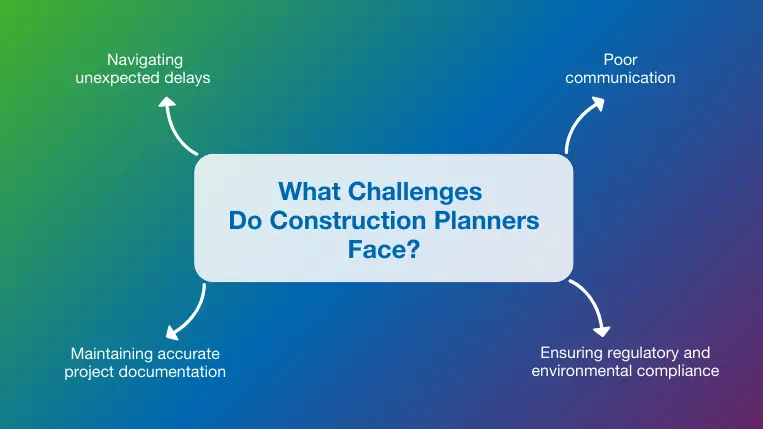
- Navigating unexpected delays: Construction planners often need to deal with unexpected delays, such as weather delays, equipment breakdowns, or supply chain issues. In these cases, they must be able to quickly reconfigure schedules without compromising project timelines or inflating budgets. Keeping the project on track regardless of these unforeseen setbacks requires flexibility and quick thinking on the part of the planner, since any delay can have a ripple effect across the entire project, leading to costly overruns.
- Poor communication: Poor communication between stakeholders – including project managers, subcontractors, and clients – can lead to rework, delays, or even safety hazards. When this happens, the construction planner must spend extra time resolving issues that could have been avoided with better collaboration. This lack of clear, consistent communication also makes it difficult for the project planner to ensure that everyone is working on the same timeline.
- Ensuring regulatory and environmental compliance: Meeting regulatory and environmental standards is another major hurdle. Depending on the specifics of the project and the location, building sites are subject to a patchwork of environmental laws, safety standards, and building requirements. To prevent fines or delays caused by non-compliance, planners must make sure the project follows these requirements from beginning to end. This involves keeping up to date with any changes to legislation, arranging inspections, and managing permit approvals. For this purpose, they support themselves with professional sustainable construction software.
- Maintaining accurate project documentation: To track progress, manage costs, and resolve disputes, a construction planner must always keep all documentation up to date. This can undoubtedly be overwhelming, especially in large or fast-paced projects. These professionals also need to make sure that this documentation is easily accessible to all relevant parties. This is a critical area of focus for planners, as poor documentation can lead to confusion, contractual disputes, and delays. For that reason, having a proper construction document management strategy in place is fundamental as it helps ensure all information is updated and available to stakeholders.
What Kind of Software Do Construction Planners Use?
Advanced technology is a construction scheduler’s best friend. This is because the success of their job depends on sticking to a strict schedule, making sure all relevant parties adhere to set timelines, making sure projects stay on budget, and more. Below, we explore the most common software that planners use to support their day-to-day operations.
Construction Management Software
Construction project management software can greatly impact a project’s efficiency and success. Planners rely on these tools for task management, scheduling, document management, communication, and collaboration functionalities:
- Task Management. This feature allows a construction planner to delegate tasks, monitor progress, and manage deadlines effectively.
- Scheduling. This allows planners to plan and schedule tasks, resources, and milestones.
- Document Management. This tool serves as a central hub for managing important documents like blueprints and contracts.
- Communication and Collaboration. The tool facilitates efficient communication and collaboration among team members.
Cost Estimation Software
A construction planner’s ability to produce quick, thorough, and precise cost estimates is fundamental to the success of any project, which is why cost estimating software is so important. By using such solutions, planners can streamline the complex process of calculating material, labor, equipment, and overhead costs, reducing the potential for human error.
Cost estimation software also allows planners to quickly adjust estimates in response to changes in scope, pricing fluctuations, or unexpected delays, ensuring that budgets remain realistic and up to date. Plus, these solutions are compatible with scheduling and project management software, so planners can get the whole picture when it comes to the project’s budget and schedule.
An example of cost estimation software is RIB Candy, a powerful tool containing planning and scheduling features that enhance efficiency, accuracy, and control over project timelines.
Apart from powerful visualization tools and dynamic scheduling, one of the key benefits is its ability to integrate detailed resource management into the planning process, allowing planners to allocate labor, equipment, and materials in real-time. This prevents resource conflicts and bottlenecks, ensuring that tasks are completed in the most logical and efficient sequence.
Document Management Software
Construction document management software offers a streamlined, structured, and centralized solution for dealing with the vast amount of paperwork and data that projects generate. Using this software, a construction scheduler can access and share all of a project’s key project documents, such as blueprints or contracts, on one secure digital platform. This centralization improves the speed and accuracy of document retrieval, allowing planners to quickly access the information they need to make informed decisions.
Reporting Software
Construction projects generate vast amounts of data, from progress updates and financial information to labor and material usage. With the help of reporting solutions, a construction scheduler can consolidate all this data into concise, actionable reports that stakeholders can access to stay informed about the project’s progress. Planners can also track budgets, schedules, and the allocation of resources with automated reporting and customizable dashboards. This allows them to spot issues early on.
RIB CostX plays a crucial role in this process, offering powerful reporting features that integrate with a planner’s overall construction management system.
It offers precise cost estimations, up-to-the-minute reporting on project expenditures, and detailed quantity takeoffs. Reports can be generated in a matter of minutes thanks to standardized templates that can also be customized to meet the specific needs of the planner and the client.
Final Thoughts
Construction schedulers play a key role in completing projects on time, within budget, and up to standard. Their expertise in scheduling, cost estimating, resource allocation, and risk management makes them essential in navigating the complexities and challenges of the different construction stages. Planners are the backbone of project efficiency – from coordinating and managing changes to ensuring compliance with regulatory standards and maintaining clear communication among stakeholders.
Professional construction planner software is essential for these professionals to digitize and automate their tasks while boosting collaboration between stakeholders. If you are ready to experience the power of innovative construction solutions, get your free demo for RIB Software today!
Most Recent
11 mins read
10 mins read
10 mins read
29 mins read
Blog Categories

Ebook



